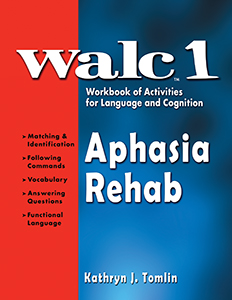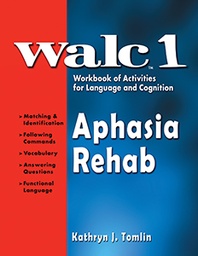WALC 1 Aphasia Rehab - Workbook of Activities for Language and Cognition
These time-tested exercises train the underlying processes of language with tasks that gradually progress in difficulty.
Written in the best-selling format of the Workbook of Activities for Language and Cognition series, these activities have:
- easy-to-read format
- simple, concise language
- consistent progression of complexity within and between tasks
- application to a wide range of acquired cognitive-language disorders
Activities are organized into five skill areas:
- Matching and Identification – Tasks begin simply, with single, more concrete items and progress to more complex tasks. The tasks are receptive. Clients match shapes, letters of the alphabet, and words. Then, they match written words, phrases, and sentences to pictures.
- Following Commands – Clients follow oral and written directions requiring comprehension of body parts, objects, prepositions (e.g., over, out), and adjectives (e.g., heaviest, shortest).
- Vocabulary – These activities target deficits in comprehension and expression. Clients choose words and supply words to complete word pairs, familiar phrases, and synonyms. Other tasks include matching words to simple definitions and clues; naming items by word class; and supplying item functions and descriptions.
- Answering Questions – The client either listens to, or reads a sentence, and answers simple wh- questions. The questions require one-, two-, and three-word responses. Yes/no questions about object functions progress from simple (e.g., Do boats float?) to more complex and abstract (e.g., Is a road wider than a sidewalk?). Comparison, before/after, and simple reasoning questions round out the activities.
- Functional Language – These activities build on the previous units by increasing the complexity and content level. Questions may have more than one right answer or require expression of opinions. Tasks include cloze phrase and sentence completion, open sentence completion, paragraph comprehension, paragraph fill-in-the-blanks, predicting from a short story, and formulating short stories.

Pro-Ed™
Cognitive Testing



